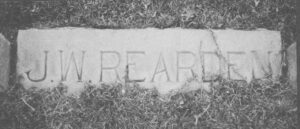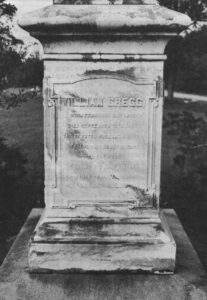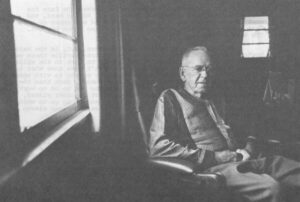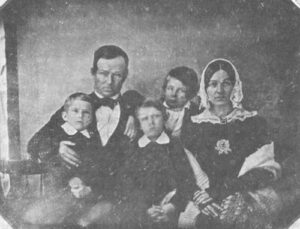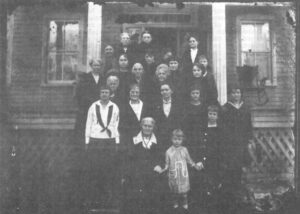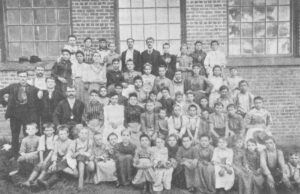April 9, 1975
L. C. “Chick” Thomas is the personnel director of Graniteville Company. He’s a relaxed thoughtful man who has worked with the Company since the early 1930’s. His office is located at the corner 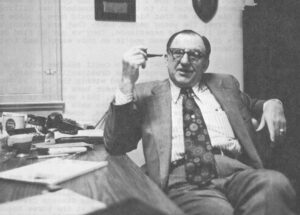 of the town’s main intersection in a large white porticoed building that was erected in 1906 as a memorial to the Company’s second president H. H. Hickman, a former treasurer under William Gregg who presided over the Company and its town for almost 30 years following Gregg’s death. Hickman Hall, as it was named, was constructed in the strict neoclassical proportions of a 19th century Greek Revival temple and was originally intended to be, in fact for many years was, a gymnasium and library for the people of Graniteville. In time, however, business expansion dictated that the building be converted into additional office space for the Company, and a new civic center was built on the outskirts of Graniteville during the early 1950’s. Today Hickman Hall houses Graniteville Company’s medical clinic, Paymaster, real estate office and personnel department. Chick Thomas’s office is in the rear of the building. His window looks out across Front Street to the First Baptist Church and to an empty lot where the old Graniteville Theater and Masonic Hall once stood.
of the town’s main intersection in a large white porticoed building that was erected in 1906 as a memorial to the Company’s second president H. H. Hickman, a former treasurer under William Gregg who presided over the Company and its town for almost 30 years following Gregg’s death. Hickman Hall, as it was named, was constructed in the strict neoclassical proportions of a 19th century Greek Revival temple and was originally intended to be, in fact for many years was, a gymnasium and library for the people of Graniteville. In time, however, business expansion dictated that the building be converted into additional office space for the Company, and a new civic center was built on the outskirts of Graniteville during the early 1950’s. Today Hickman Hall houses Graniteville Company’s medical clinic, Paymaster, real estate office and personnel department. Chick Thomas’s office is in the rear of the building. His window looks out across Front Street to the First Baptist Church and to an empty lot where the old Graniteville Theater and Masonic Hall once stood.
“There used to be an expression in this town. Graniteville Company used to say we raise our own help around here. We’ve got four, five and six generation families in this town who have never worked for another company. Phinizy Timmerman, the president, was raised right there on the street in Graniteville. Jerry Johnson, the vice-president, was raised right there on the street in Graniteville. They call him Jerry. They call Phinney, Phinney. They respect him as president. They say Mr. Timmerman this, Mr. Timmerman that, because they respect him for his position. There never has been a stranger in the management group here at Graniteville.
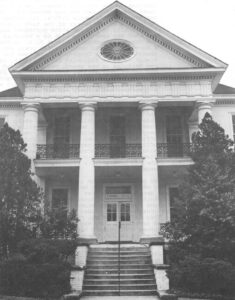
“I think you weave right into the cloth the character of this company and its people. You say Big G, they swell. The people of Graniteville are proud of the Big G. They turn out a darn good piece of cloth. The industry recognizes it and wants to buy it. Sure some uneasiness has crept in. But that’s true all over the country. What’s happened to the feelings of our people toward the flag of this country? Toward their government? They’ve changed. What do you think Watergate did to this country? But I’ll tell you this, you find any man around here who’s worked for Graniteville Company ten years or more and ask him, if he had the same job somewhere else, would he go to it? He will tell you no, nine times out of ten.
“The younger person today just hasn’t experienced what we’re talking about, this sense of loyalty. He hasn’t lived here long enough. He hasn’t lived anywhere long enough to be loyal to anything. I mean I wouldn’t want to wish it on anybody, but he’s never seen hard times. The average guy, not so much today but a year or two ago, could walk out the door and get him a job anywhere. Why I grew up 30 miles up the road. Hitchhiked down to Graniteville to try and find a job right out of high school. 1933 it was. Those were hard times. Graniteville Company gave me a job when there wasn’t a job to be had anywhere. I can tell you Graniteville Company’s been good to me.
“You know, life comes up on me and you and everybody else until finally you begin to see the purpose of this country. I mean why are you here? Why are you on this earth? I’m 61 years old, and I never even thought about it until I was in my 50’s. They’d talk about sacrifice, about having paid the price, white crosses overseas and all that. It didn’t mean a thing to me. I’d say tough luck. But now I see that this country’s here because somebody wanted it to be here. Somebody was willing to give up his life so that his family could have a place to live and be free. The young people today that are growing up, they’ve got to live this experience. They’ve got to find out that there’s only one reason you’re on this earth, and that’s to serve others.”
“Hello, I’m Cecil Bearden with the orientation program for Graniteville Company. Each of you has been hired within the last 24 hours to begin your employment here or to ‘begin it again’ as the case may be. This session is for your benefit. You’re gonna make some decisions out there, some good ones, some bad ones. Those good ones gonna put jingle in your pocket, those bad ones gonna put tears in your eyes. I’m here to give you some practical advice on what you’re gonna face out there in case you haven’t been out in this type of work before. And if you have, you’re gonna say ‘how true it is.’”
Rev. Cecil Bearden is standing at the head of a small classroom in the Company’s new training building adjacent to Hickman Hall. Rev. Bearden lives about ten miles away in North Augusta, where he is the pastor of the Big Stevens Creek Baptist Church. Twice a day, in the morning at the three Augusta divisions and in the afternoon at the eight Valley divisions, he introduces all new employees to life in a Graniteville mill.
Today there are six returnees out of eight (males)at the session. Blacks outnumber whites three to one, and all but one are apparently in their teens or early 20’s. The orientation program will last three hours and will involve a 1 _ hour introductory talk, a slide show on textile technology, a half hour film on plant safety and a brief tour of one of the plants. One man nods off in the first five minutes and is immediately awakened by Rev. Bearden, who reminds him that he is already on Company payroll and that the Company don’t pay nobody to sleep on the job.
“Let me see a show of hands of all those who have made more by the hour on some other job than you’re gonna make here. Let me see…six out of eight. Question number two. So why aren’t you still on the job where you made more money? What I’m trying to get across is this: look and see how dependable the job is. It’d be a big mistake for you to think you’re gonna go out and lick the world or get rich quick, because you’re gonna be tucking your tail between your legs and coming back soon enough. You’ll be a lot better off with a little less money but it’s consistent, steady and regular than if you get it in spurts, because you’re gonna spend it just about as fast as you get it.”
Chick Thomas continues: “You know the generations here just keep coming up, because the people here in Graniteville have found a way…by just working day after day, doing the best that they can, to become able to see that those sons and those daughters and those after them will do better than they did. That’s the satisfaction they get out of it. Why I’ve had I don’t know how many women bring their young boy in to me just out of high school and say, now I don’t want him to do this type of work over here where I was. I want him to be able to go over here to this job. I want him to do this, to do better than I did. I want him to get into a place where he can work his way up in the Company. She wants her son to have a chance to do what she never could do. You know back in those days she didn’t think she had the education to do those things.”
The motto of the Graniteville Company is the following: “No institution can remain great unless it respects the noble features of its own past and unless it encourages the kind of service and devotion which makes that respect possible.”
Service, for Chick Thomas’s generation of Graniteville employees is more than just a word engraved on the back of the over 700 gold watches given last year to those who had worked for the Company for 25 years or more. Graniteville’s James Wesley Rearden died on March 26, 1959 with the longest record of continuous service with a single company of any industrial worker in history. His extraordinary 87 years with the Graniteville Company began in 1872 when, as an eleven year old boy, he got his first job as a packer in the cloth room of the old granite mill.
On May 10, 1947, at the anniversary of Mr. Rearden’s 75th year of employment at Graniteville, he was honored with a dinner at the Bon Air Hotel in Augusta, and a half hour radio program dramatizing highlights from his career was broadcast throughout the State. When asked to recount several events that he remembered most pleasantly, Mr. Rearden mentioned two:
“On October 26, 1939, St. John’s Methodist Church gave me a loving cup. On it was engraved, ‘For years of Faithful Service.’ I’m really proud of that cup.
“And then, several years ago, Mr. Sam Swint, President of Graniteville Company, put my picture on the wall in his office. He called me in and told me he was proud of my work record and that he was going to hang my picture right there alongside those of the former presidents of the Company. That made me feel mighty proud.”
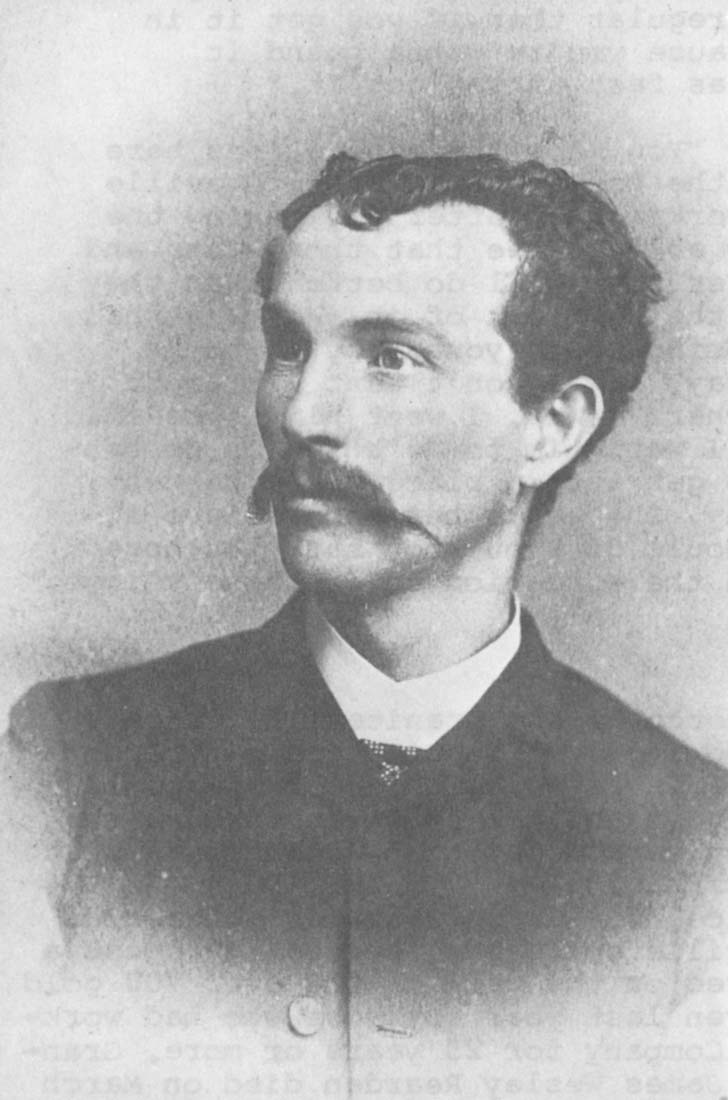
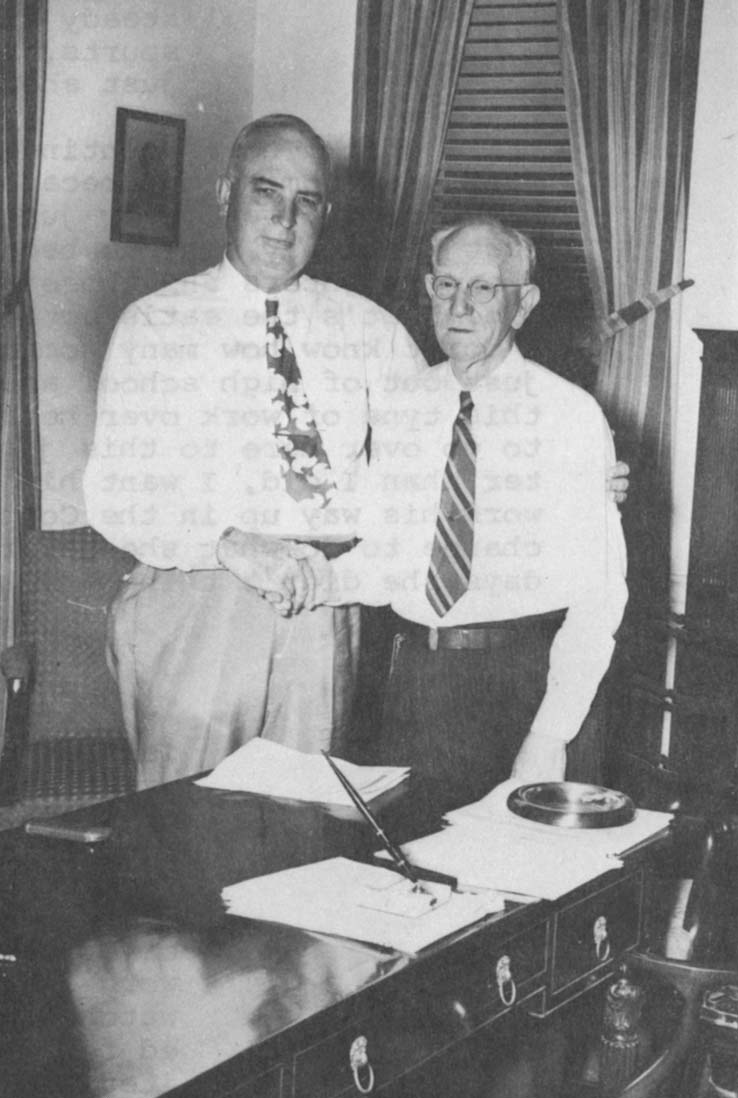
In 1950 a London firm by the name of Thomas de la Rue Ltd. challenged the National Association of Manufacturers to find an American with a longer continuous employment record than the 75 years currently held by one of their workers, a man named Mr. Harry Adkins.
N.A.M. immediately began a nation-wide search for an American contender for the title. A few months later, when Mr. Rearden was discovered with a service record at the time of 78 years, Thomas de la Rue Ltd. sent Mr. Rearden a replica of the very same silver tray that they had presented to Mr. Adkins, on which were inscribed the words “Loyalty is the true insignia of manhood.”
Photographs courtesy of Fraiser Sofge, assistant treasurer and photographer for the Company, 1935-56.
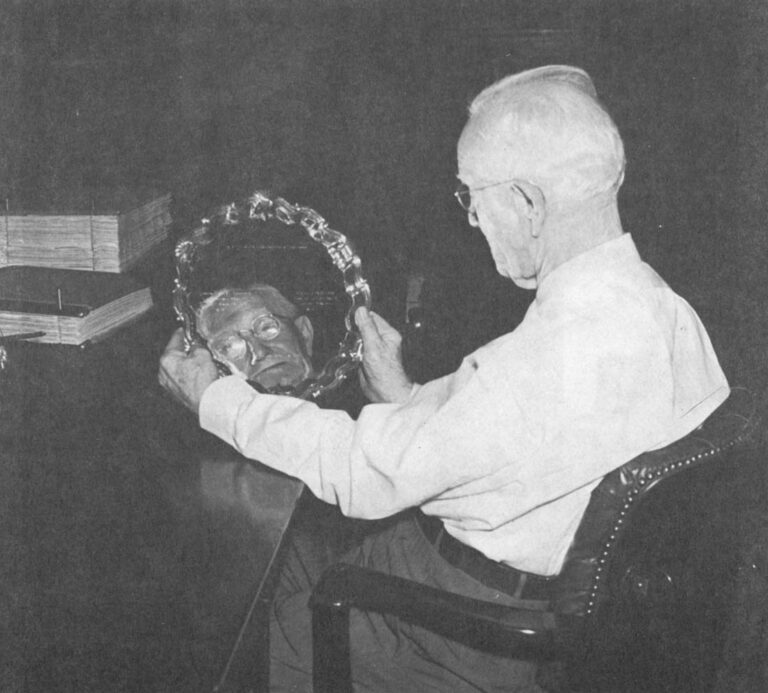
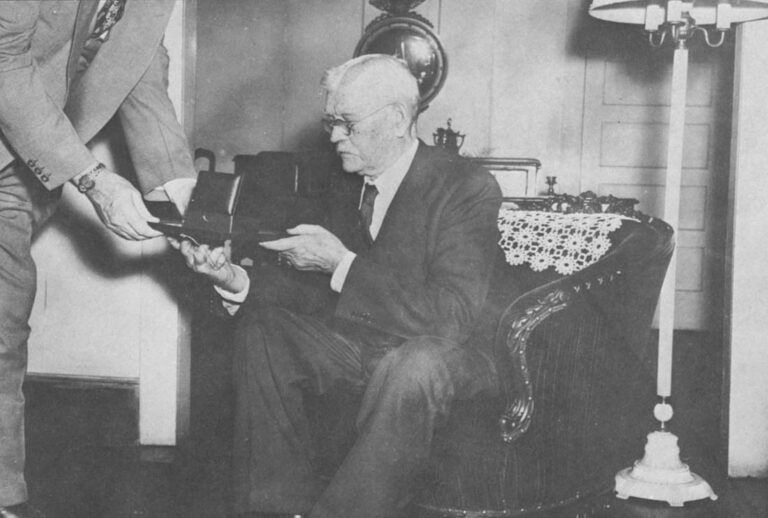
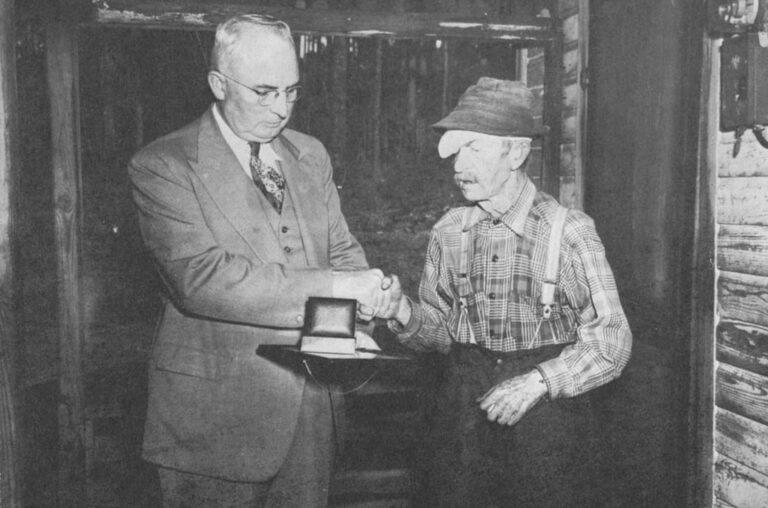
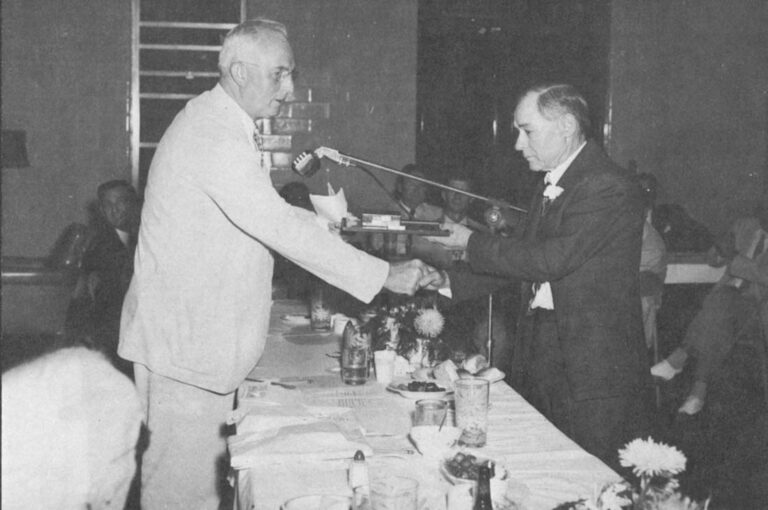
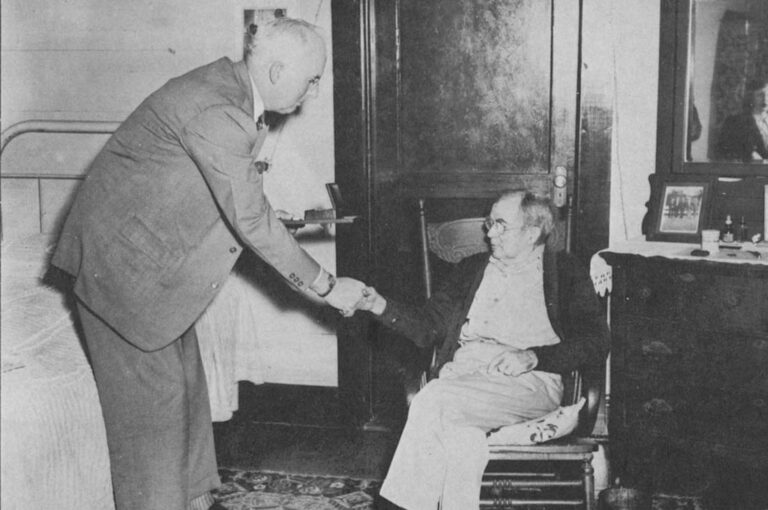
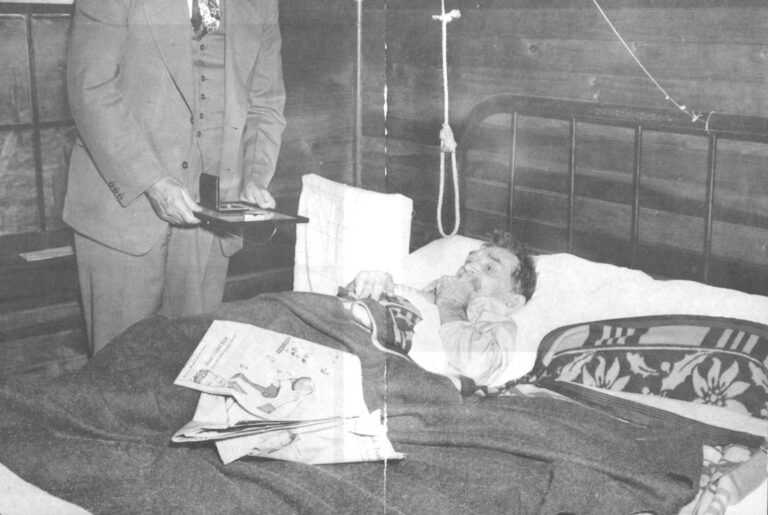
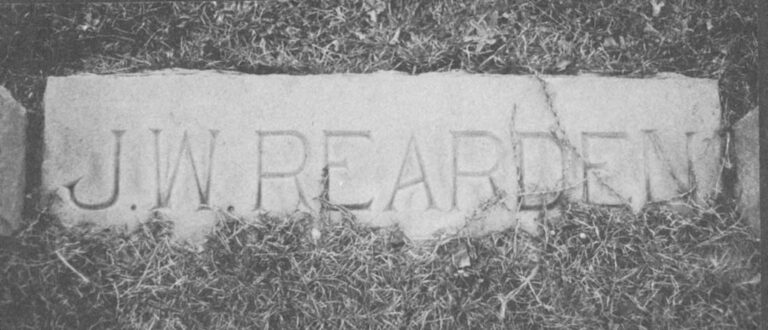
Received in New York on April 10, 1975.
©1975 Richard Pearce
Richard Pearce, a freelance film-maker/journalist, is an Alicia Patterson Foundation award winner. This article may be published with credit to Mr. Pearce and the Alicia Patterson Foundation.

